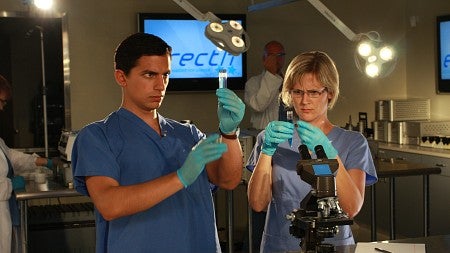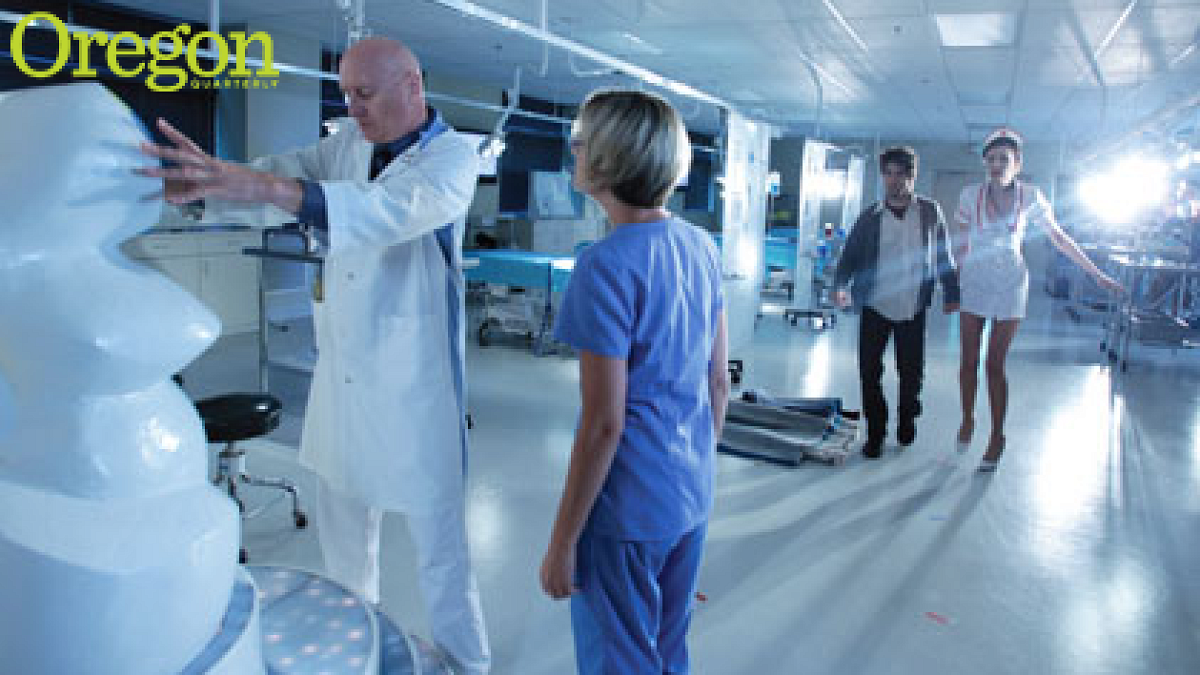Despite the sign over the movie theater broadcasting that golden word “HOLLYWOOD” into the rainy dark, the scene at the world premiere of Little Blue Pill feels rather far from Tinsel Town glamour. Here at the charmingly threadbare Hollywood Theatre, located in Portland’s namesake Hollywood District, you’re much more likely to find plastic tumblers of microbrew than flutes of champagne. And there’s no red carpet tonight, just a wet sidewalk.
Still, there’s a crowd in the lobby and the smell of popcorn in the air. The film’s writer-director-producer, Aaron Godfred, MBA ’05, stands in front of the packed theater and introduces his first feature-length movie. He concludes by uttering those magic words, “Roll film,” which sends a shiver of excitement through the audience as the lights dim and the opening credits appear.

It’s not quite Citizen Kane. But neither does it aspire to be. Little Blue Pill is firmly and unapologetically a so-called broad comedy, a genre characterized by plenty of physical humor, ridiculous premises, and broadly defined, yet ultimately relatable, characters. Recent broad comedies like The Hangover and Pineapple Express have raked in the cash at box offices, capturing the adoration of that all-important eighteen-to-thirty-five-year-old male demographic. But most independent filmmakers haven’t tackled the genre, preferring to make dramas, documentaries, and low-budget horror films.
Perhaps tellingly, Godfred wrote his screenplay while he was living and working in the epicenter of the Hollywood machine, during the three years he spent in Beverly Hills employed by what is now William Morris Endeavor, the world’s largest talent agency and the real-life inspiration for the TV show Entourage. As per long company tradition, Godfred started out in the mailroom “with a bunch of people who had dropped out of medical school or passed the bar in two different states,” he says. “Everyone there is overqualified.” Luckily, after just a few weeks, a position opened in the agency’s story department, so Godfred traded up from a mail cart to an endless avalanche of scripts, and source material for yet more scripts.
Among the dozens of magazines that were delivered to the story department, which Godfred’s job required him to mine for screenplay ideas, he noticed a string of articles about celebrities’ misadventures with erectile dysfunction medication. So when a fellow guest at a wedding in Vermont had a yarn to relate about a friend-of-a-friend, an ordinary guy who had been involved in similar shenanigans, the idea that became Little Blue Pill was born.
There’s more than a little tongue-in-cheek commentary in the film about male sexuality, the pharmaceutical industry, and the perils of finding roommates on Craigslist. The characters are enjoyably larger-than-life, as is Phalitech’s headquarters, which features a laboratory that would make any Bond villain proud. But the movie, which Godfred and his crew filmed in Portland during July 2009, is also filled with mementos of real-live Portland— Voodoo Doughnut’s bacon maple bars, Pittock Mansion, the Portland streetcar, and the fact that “youcould see Mount Hood over there, if it wasn’t so cloudy.” The White Stag Block even makes a cameo appearance in one shot as our hero rides a bike over the Burnside Bridge.
Godfred chose not only to film the movie in Portland, but to create a very Portland-centric movie, because of his ties to the area and the large numbers of friends, supporters, and collaborators living in and around the city. Although originally from Alaska, where he got his filmmaking start shooting footage of his buddies doing snowboard tricks in the backcountry, Godfred spent his college and graduate school years in Oregon, earning a bachelor’s degree in international business from Linfield College as well as his MBA in general business with a focus in sports marketing from the University. While in graduate school, he took a filmmaking course, and created a documentary about the University during the Vietnam War called Oregon’s War at Home. The film won a Northwest regional Emmy, and Godfred began to think seriously about filmmaking as a career.

In big-budget Hollywood, almost limitless cash flows allow production teams to realize every nuance of a director’s vision while maintaining all the creature comforts of the celebrity lifestyle. When making an independent film on a shoestring, the rules are a little different. Godfred and his production team rented a floor of a Portland State University dormitory for the monthlong shoot, and borrowed everything from houses to cars to props from friends and family in the area. More than a little creativity and quite a lot of hard work was involved: to create the swarm of little blue pills that appears in the title sequence, prop master Alex Evans individually sanded, primed, and spray-painted hundreds of Pez candies. For that bicycling shot over the Burnside Bridge, instead of using a dedicated dolly truck rigged to accommodate cameras and lights, the filmmakers simply stuck the equipment out the back window of Godfred’s Subaru Outback. When informed of this somewhat unorthodox plan, Godfred remembers with a smile, the Oregon Governor’s Office of Film and Television, which issues permits and oversees filming, replied, “Okay, but keep it under the speed limit.” That accommodating attitude contrasts fairly starkly with the sort of experience filmmakers have in Los Angeles. For another scene, Godfred and his team needed to close down an intersection and redirect traffic. In LA, this would require permit fees of several hundred dollars, as well as hiring four off-duty police officers at $140 per hour each, plus a street monitor from the city. Closing an intersection in the Pearl District required filing for a free permit and hiring one flagger. Oregon’s newly enacted film incentives and the general esprit de corps that the cast and crew experienced in Portland made for a great filmmaking experience, Godfred says, and he’d be happy to do it again someday.
Godfred is currently polishing a new screenplay—this one about unemployment—while promoting and marketing Little Blue Pill. Because independent film festivals traditionally shy away from broad comedies, preferring instead to show the types of films that never get near the neighborhood mall’s cineplex, Little Blue Pill hasn’t been welcomed onto the festival circuit, the avenue by which most independent films find an audience and, if the filmmakers are lucky, mainstream distribution. Fortunately, that grand democratizer called the Internet means that anyone with an iTunes account can watch Little Blue Pill, share it with friends, and build the sort of buzz for the movie that Godfred hopes will win it a spot on Netflix and wider audiences to come. Meanwhile, his efforts continue: independent filmmaking means you’re your own promotions, marketing, and distribution department, too. “Finishing a movie is like the tip of the iceberg,” he says.
Ultimately, Godfred would like to be a part of the Hollywood studio system, directing mainstream blockbuster comedies and action flicks. “It’s going to take time and a little bit of luck to get there,” he says. But with one completed film under his belt, plus an MBA’s worth of business savvy to help him along, the road from the Hollywood Theatre just might lead to the Hollywood sign.
—By Mindy Moreland, MS ’08


